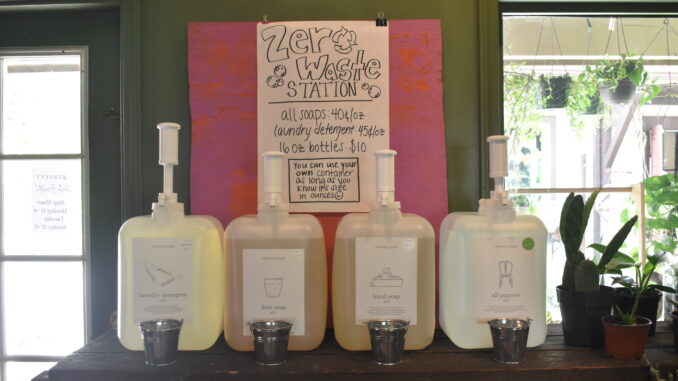
Dish soap, detergent and cheese? Normally these three things wouldn’t go together, but they do at the Grazery.
The Grazey is an artisan cheese, cafe and plant shop located in Water Street Market. On top of their selection of food and florals, the Grazery has just established a zero waste station in store.
What’s a zero waste station?
Essentially the restaurant has set up a counter with large dispensers of all-natural soaps and detergents. Customers can bring their own vessels, such as an empty detergent bottle, to fill up on these products as long as they know the vessel’s weight in ounces. Customers can also buy a 16 ounce vessel from the store itself. The products cost 40 cents per ounce.
In the future, the store would like to sell chewable toothpastes which would erase the need for plastic toothpaste tubes, bar shampoo and conditioner which would get rid of the need for plastic containers for these products as well as shampoo and conditioner dispensers so customers could refill on that as well.
The Grazery is also looking into selling essential oils, so customers can scent their own hair care products.
But how does this lead to zero waste?
As customers we may not often consider the environmental impact of purchasing bulky detergent jugs or even small hand soap dispensers or shampoo bottles, using the soap up, and then throwing out the product.
Many of these containers are plastic, a number one enemy to our environment, plastics don’t decompose for centuries.
Though both of these products can be recycled, in general only 9% of all plastics total are recycled properly.
Zero waste stations such as the newly established one at the Grazery are all about the power of reusing.
“There’s something about throwing away that plastic bottle every time you have your dish soap right?” asked Grazery co-owner Greg Gagne. “Now [you’re using] one plastic container instead of 120 or 150.”
Gagne is well aware of the wasteful reputation restaurants and the food industry have. Not just in food waste, but the use of single-use plastics as well.
The Grazery often wraps their cheeses in plastic, and with the pandemic and a rise in take out food, lots of customers would be taking food containers out the door that would eventually be thrown away.
The zero waste station is another tool the restaurant has been using to incorporate sustainability in their store. The store has started to switch to hay straws over plastic and to sustainable birchwood forks.
“We’re just always trying to be better,” Gagne explained.
Other businesses in the state that have been using the zero waste movement include Woodstock Bring Your Own in Woodstock, a store which, similarly, allows individuals to bring their own containers and fill up on household goods.
Another business is Common Good in Brooklyn, which the Grazery bulk buys their refill products from, Common Good pairs with zero waste stations across the country and sells refill bottles and household goods on their website.
